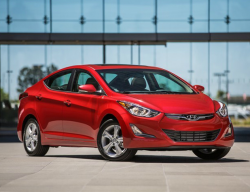— A Hyundai Elantra engine lawsuit has been dismissed after the judge ruled the plaintiffs simply couldn't allege facts to support their claims about engine failures.
The class action lawsuit alleges 2011-2016 Elantra cars are equipped with "Nu" 1.8-liter engines that have piston defects. The piston problems allegedly cause the engines to knock, tick and fail, causing a loss of engine power, power steering and power brakes while driving.
Plaintiffs Elizabeth Brown, Thomas Pearson, Janeshia Martin and Nicholas Moore allege all 2011-2016 Hyundai Elantras in the country are defective and the automaker allegedly knew it when the cars were sold.
Certain claims had already been dismissed with prejudice, including Martin and Moore’s implied warranty claims and Brown’s common law fraud claim.
Hyundai filed a motion to dismiss the remaining claims, starting with Pearson's claim for economic harm. The automaker argues the engine in Pearson’s Elantra failed in July of 2018 when the car had about 76,000 miles. The plaintiff contacted Hyundai and the car was towed to a dealership which said the engine needed to be replaced.
Hyundai agreed to cover the cost under warranty but said the plaintiff needed to pay for rental car repairs. Pearson allegedly spent $800 on rental cars, but the judge says the lawsuit "conspicuously leaves open the possibility that Pearson will be reimbursed at some point for his rental car fees."
According to the judge, “When a plaintiff claims that a defendant’s threatened injury is the source of his standing, he must show that the threatened injury is so imminent as to be ‘certainly impending.'” However, the lawsuit doesn't show Pearson's rental car costs are "certainly impending," meaning he lacks standing to make the claim.
The judge also ruled Pearson’s claims of future repairs and diminished value of his Elantra are flawed, and the plaintiffs failed to assert facts showing Hyundai's replacement engines contain the same defects alleged to exist in the original engines.
The judge also dismissed breach of express warranty claims made by plaintiff Brown and did the same for plaintiffs Martin and Moore because the cars were not under warranty when the engines failed.
A breach of implied warranty claim for plaintiff Brown was dismissed because Hyundai refused to pay for repairs under warranty because the Elantra engine allegedly failed due to oil sludge created by inadequate maintenance. The judge also noted Brown still drives the car.
The judge then moved to a claim that Hyundai violated the federal Magnuson-Moss Warranty Act and ruled the claim must be dismissed because the plaintiffs failed to state any of their state law warranty claims.
Plaintiff Brown’s claim under the New Jersey Consumer Fraud Act was dismissed because she didn't adequately plead that Hyundai knew of the alleged piston defects.
The judge referenced a case titled, Schechter v. Hyundai Motor America, which alleged Hyundai fraudulently concealed that 2017-2018 Santa Fe and Santa Fe Sport SUVs contained defective powertrains.
The plaintiffs in that case said the automaker must have known about the problem because of customer complaints posted on the National Highway Traffic Safety Administration (NHTSA) website. In addition, Hyundai had sent dealers two technical service bulletins about the powertrains.
However, just as in the Elantra lawsuit, the plaintiffs did not allege Hyundai monitored or tracked the NHTSA website or that NHTSA informed Hyundai about the posted complaints.
“Absent such allegations, consumer complaints on third-party websites are insufficient to support a manufacturer’s knowledge of an alleged defect. Based on the facts presently before this Court, Schechter’s reasoning applies with equal force." - Judge Susan D. Wigenton
In addition to dismissing those claims, Judge Wigenton also dismissed Georgia and Illinois fraud claims and deceptive trade practices claims.
The Hyundai Elantra engine lawsuit was filed in the U.S. District Court for the District of New Jersey, Newark Division - Brown, et al., v. Hyundai Motor America, et al.
The plaintiffs are represented by Sauder Schelkopf LLC, Migliaccio & Rathod LLP, and Levin Sedran & Berman.
CarComplaints.com has complaints about Elantra engine problems:

